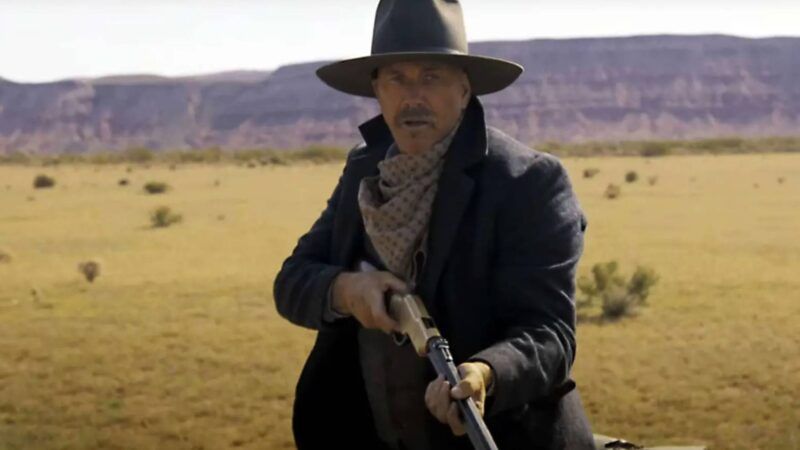Kevin Costner's Neo-Western Horizon: An American Saga—Chapter 1 Is an Interminable Slog
Costner stars, directs, and writes in what amounts to a three-hour prologue for a better movie.

I am a long-time admirer of Kevin Costner.
As an actor, he's been a sturdy big-screen presence for four decades, and his small-screen turn as a gruff, tough family patriarch in Yellowstone is a big part of what has made that show so successful over the last five years. Costner's work behind the camera, meanwhile, has never been short of interesting. Whatever its contemporary reputation, Dances With Wolves remains a powerfully made Hollywood epic. Costner's much-maligned adaptation of The Postman is a mess, but it's a fascinating curiosity, an ambitious and personal undertaking from a filmmaker determined to take big swings on the big screen.
So it is with great regret that I say that Costner's latest film, Horizon: An American Saga—Chapter 1, is very nearly unwatchable. I say "very nearly" because I did, in fact, watch it. Somehow. Barely. And I am here to warn you away.
You should not subject yourself to this movie. Not even if you love westerns. Not even if you adore Costner. Not even if Dances With Wolves is your all-time favorite movie. Not even if you have binge-watched all five seasons of Yellowstone a half-dozen times. Costner's plodding three-hour prologue is interminable, unsalvageable, and flat-out impossible to care about. Rarely has the word "slog" been such an apt description of a movie. And that "Chapter 1" has been appended to the title because if Costner has way, there will be three more of them.
That's right: Horizon: An American Saga—Chapter 1, is the first of an intended four-part series, each presumably as long and interminable as this one. The second part has already been shot and is scheduled for release later this summer. I cannot imagine wanting to sit through it, let alone two more in some future year.
The best you can say about Horizon's first chapter is that, like Costner's better work, it is ambitious and personal, a big-screen big swing that Costner has been trying to make for years, and that he financed largely out of his own pocket. Set in the mid-1800s as Americans were moving west, the movie sprawls over much of America's frontier, depicting land-based conflicts between U.S. citizens and Native Americans, and competing visions of whether and how different peoples can or should live together.
The sprawl and sweep of the movie are vast, and as in both Dances With Wolves and Yellowstone, there are some truly stunning vistas on display. But the story offers a hodgepodge of shrug-worthy characters and muddled plotlines, none of which come together or pay off.
More than anything else, it's the sheer volume of characters and plotlines that drags this movie down. Costner plays Hayes Ellison, a gravel-voiced horse trader who has a way with a gun, but he doesn't show up until an hour into the film. He's the best part of the movie, but he seems lost amidst the pile-up of characters.
Well past the two-hour mark, entirely new locations, characters, and plotlines—most of which could probably support their own normal-length feature film—continue to appear, as if Costner has set out to chronicle the life of every single individual settler who ventured West in the mid-1800s. When you sit down to watch a movie with the subtitle "An American Saga," you do not really expect it to attempt to tell the story of every single American. And yet. The cast list resembles a census for a small country. I have long been a critic of overpopulation fears, but for this movie, at least, I've changed my mind.
The movie's grandiose subtitle, combined with marketing hinting it's about the making of modern America, suggests an interest in capturing the American West in a pivotal moment of transition. That tracks with Costner's obsessions: In Dances With Wolves, his young Civil War officer character wants to head out to the frontier to see it before it's gone. Yellowstone, which Costner produced, is a story about fighting to keep the area's natural beauty intact.
But Horizon's convoluted sprawl makes it difficult to even pin down what the movie is trying to say: Plotlines keep cropping up, like garden weeds; it's never clear what's driving the movie, except the ambition to pack the entire American West into the production. Some of the actors—Will Patton, Danny Huston, Luke Wilson—are familiar enough that you'll remember their faces, but the characters themselves are too indistinct, too thinly sketched. The movie seems to be promising that you'll get to know them eventually, over time. As the movie goes on, and on and on and on, this promise seems more like a threat.
Making a three-hour movie that effectively uses its full running time is difficult but not impossible. Indeed, Costner's own Dances With Wolves, which methodically builds out a conflict by telling a single intimate story centered around one character, is a masterful demonstration of how to pace and structure a long feature.
But Horizon comes across like the shaky first few episodes of a TV series. It's all setup and introduction and promise of intricate narrative payoffs down the road, after you've invested a dozen or more hours over several years. Stick with it, the movie seems to say, and the good stuff will arrive eventually. It'll be a journey, like the West itself. If that's what Costner wants to do with his stardom and his fortune, then I wish him well. Go West, old man. But I won't be taking this journey with you.


Show Comments (10)